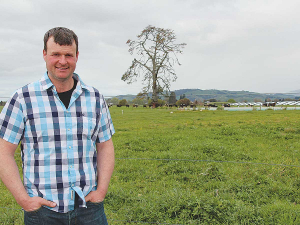2024/25 Dairy Statistics: NZ dairy farmers boost production with fewer cows
According to the New Zealand Dairy Statistics 2024/25 report, New Zealand dairy farmers are achieving more with fewer cows.
 Brad Payne's first several herd tests of the season sorts out the herd's best new milkers and influences mating decisions.
Brad Payne's first several herd tests of the season sorts out the herd's best new milkers and influences mating decisions.
Cambridge dairy farmer and breeder Brad Payne would herd test ten times a year, but he works as an LIC AB Technician during October so reluctantly sacrifices data he’d get during that month of the year.
And while he accepts that herd testing four times a year is standard practice, Brad admits he’s no ordinary farmer and does things “a bit differently.”
He copes fine with his nine, as opposed to 10, herd tests annually, he says.
“For me, it’s all about data and the insights it provides,” Brad says.
“Herd testing is crucial to any farmer, without a herd test you have nothing to go on.
“Just look at any business, like banks for example: Now they do budgets and audits on their financial positions all the time. It’s just a way of doing basic checks and balances and making sure nothing is amiss.
“Farmers are no different – to me the herd test is a basic, regular, audit. I need to see the profitability and health status of each cow. Each cow is a profit centre; some profit centres will perform and make me money, but I need to identify and weed-out the ones that don’t.”
Given the state of his herd, it’s hard to argue with Brad’s strategy of constant measuring and monitoring: His herd’s breeding worth and production worth (BW & PW) are ranked in the top-2% and top-1% respectively of the national milking herd (i.e. all herd-testing herds that milk a minimum of 50 tagged cows).
A system four farm, Brad’s 750-strong milking herd is 25% Jersey, 25% Friesian, and 50% KiwiCross cows.
Even in a low payout or drought year, Brad’s advice to fellow farmers is to avoid cutting the herd test from the budget; rather, it should be thought of as a nondiscretionary investment, he says.
“During a low payout if you’re saying no to even a single herd test, well that’s a year’s worth of figures you’ve lost. I know that all people don’t sell or do the breeding thing, but if I was that sort of farmer who was without a single test, I’d have no idea of what’s going on.”
While parentage information is useful, it’s not enough, Brad says.
“Her parentage might be good, but she could perform a long way from what the parent average is, because that’s nature. Parentage information, even genomic information, reduces risk – but I still put a lot of emphasis on the first herd test.”
As a breeder, Brad uses his herd test information late-June and September to identify young cows for embryo transfer work. “If the genomics says they’re good and the early herd test information says they’re good, I’m happy. The herd test serves as good confirmation of decisions we make.”
Because the farm also does all-AB, it consistently has surplus heifer calves, and herd test information provides Brad with information on, for example, month-old calves. “So when I’m in a position to sell some, I’m always selling off my bottom-end,” he says.
The January herd test samples double as a test for Johne’s disease information, data that feeds in to the farm’s 10-year Johne’s control plan.
As a commercial farmer, Brad says herd testing is crucial in monitoring somatic cell counts, helps dictate mating decisions, helps decide on culls as possible feed pinches emerge, and heavily influences which surplus cows to sell (should there be a high number of replacement stock).
But the herd test is also a way of knowing which cows are delivering ‘honest’ milk.
“The milk docket gives you your herd average, but the herd test tells you who your really good cows are, and who aren’t.”
At the end of the season, herd test information is used for dry off decisions, with days-in-milk and production worth balanced against the health and wellbeing status of the cow, and individuals picked out for targeted dry cow treatment.
New Zealand's new Special Agricultural Trade Envoy, Horowhenua dairy farmer, company director and former Minister of Agriculture, Nathan Guy says the Free Trade Agreement (FTA) with India is a good deal for the country.
New figures show dairy farmers are not only holding on to their international workforce, but are also supporting those staff to step into higher-skilled roles on farm.
New tractor deliveries for 2025 jumped 10% compared to the previous year, a reflection of the positive primary sector outlook, according to the Tractor and Machinery Association (TAMA).
Entries have opened for two awards in the New Zealand Dairy Industry Awards (NZDIA) programme, aimed at helping young farmers progress to farm ownership.
Federated Farmers has confirmed interim chief executive Mike Siermans to the role.
Registrations are now open for the 2026 Ruralco Golf Classic, with all proceeds from the event set to support the Mid Canterbury Rural Support Trust.
OPINION: When it comes to New Zealand's foreign relations, Foreign Minister Winston Peters likes to make all the big calls;…
OPINION: Another example of the dairy sector getting shortchanged in free trade deals?